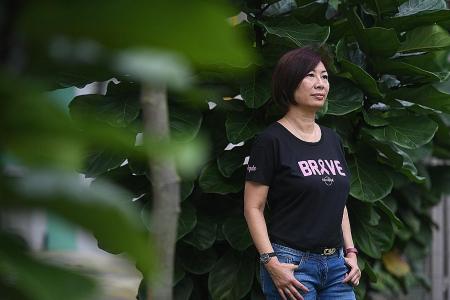Covid-19 in Singapore: A year on, recovered virus patient still can't taste or smell
She has mixed feelings about Chinese New Year after her infection caused family and friends to be quarantined
Chinese New Year is traditionally a time of celebration, joy and family visitations.
But for Ms Julie Ong, 54, it is a grim reminder of what she went through a year ago, so much so that she has mixed feelings about this festive season.
On Feb 8 last year, she tested positive for Covid-19 and was announced as Case 38. She was warded at the National Centre for Infectious Diseases (NCID) for 10 days.
Before being diagnosed, she attended a Chinese New Year gathering. Her family members and friends who had contact with her were quarantined and eventually tested negative.
Ms Ong told The New Paper: "I was apologetic about the inconvenience I caused. But I was relieved that I didn't infect anyone.
"It has made me more cautious. I won't be doing any visiting because I don't need another 'memorable' Chinese New Year."
Instead, Ms Ong will be going on a cruise with her 75-year-old mother.
A year on, she still avoids large crowds and even small gatherings, other than church services, and she keeps a diary of who she meets for contact tracing purposes.
She suffers from leftover Covid-19 symptoms such as loss of taste and smell but has learnt to live with it.
"It is dangerous when I cannot smell things like gas from the stove, so I have to be more vigilant. I also check my car more regularly to see if anything is wrong," she said.
STIGMA
Ms Ong added that former patients like herself face a stigma because people assume they must have behaved irresponsibly.
"I don't blame them, but the virus doesn't pick and choose. I went about my regular routine and lifestyle, and one day I got it. It can infect anybody."
Ms Ong, who has a 26-year-old daughter, volunteered for NCID's coronavirus research and has had 30 swab tests and five blood tests, giving six to eight tubes of blood each time.
She also "kind of expected" the recent rise in community cases as she thinks people are getting more complacent.
But she noted those who are overly paranoid also cause fear and anxiety in people around them, when all everyone needs to do is follow the rules.
"People don't realise the impact of their actions until they are affected directly," she said.
Ms Ong recalled how she woke up with a slight sore throat last month on the day she had an online job interview.
She admitted she was afraid to see the doctor in case her worst fears were confirmed.
But in the end, she postponed the interview and saw a doctor.
"It can be scary, but I live with my 75-year-old mother. I cannot afford to be irresponsible. So I go for regular checks and if I am not feeling well, I see a doctor. It is the right thing to do," she said.
On vaccines, she is not certain if it is a one-size-fits-all prevention against the virus, and she is still unsure about getting vaccinated as she still has antibodies from her infection to give her some immunity.
On what Singapore should do to curb the rise in community cases, Ms Ong said: "It is really up to the individual. We can go back to phase two, we can start lockdown again or make the rules stricter, but some people will still breach the rules.
"The Government cannot possibly micromanage everyone. Instead, each individual needs to play his or her part to be more responsible and adhere to the rules."
Covid patient, who spent 60 days at NCID, wary of new virus wave
After spending 60 days at the National Centre for Infectious Diseases (NCID) battling Covid-19, Ms Isabella Lim takes the virus seriously and urges others to do the same.
The current rise in community cases and clusters proves the unpredictability of the virus, and she is worried there could be another wave here.
The 26-year-old business operations executive, who was announced as Case 547 on March 23 last year, told The New Paper: "The virus is scary and no one expected it to last so long. I really don't want to go through the same thing again.
"After recovering, I completely avoided crowded places and have had no nightlife. I prefer to hang out at home now."
She added: "Some people may be asymptomatic, and you never really know. But for those who experience symptoms, it is only responsible to see a doctor and be more vigilant."
LONDON HOLIDAY
Ms Lim and her boyfriend did just that after returning from London last March.
They stayed in an apartment during their two-week holiday in London and did not go out much, masking up whenever they did.
On their return flight, they wore double masks out of fear but ended up sitting behind a family that was coughing profusely.
Back in Singapore, they decided to self-isolate at home together and cut off physical contact from their loved ones.
After two days of a slight cough and a fever respectively, Ms Lim and her boyfriend consulted a doctor and checked themselves into NCID. There, they found out they both had contracted the disease.
She said: "I feel so thankful to be in Singapore as it is much safer and better healthcare-wise than in the UK. I felt so privileged that I was offered a medical ward despite having only mild symptoms."
Though the situation has improved from last year, Ms Lim warns against complacency and believes everyone must still follow the rules such as wearing masks and safe distancing.
"A lot of young people might think, 'it is okay if I get it', and that it will affect only them. But people breaching the rules (need reminding that they) are compromising their family members and risking their lives."
Get The New Paper on your phone with the free TNP app. Download from the Apple App Store or Google Play Store now



